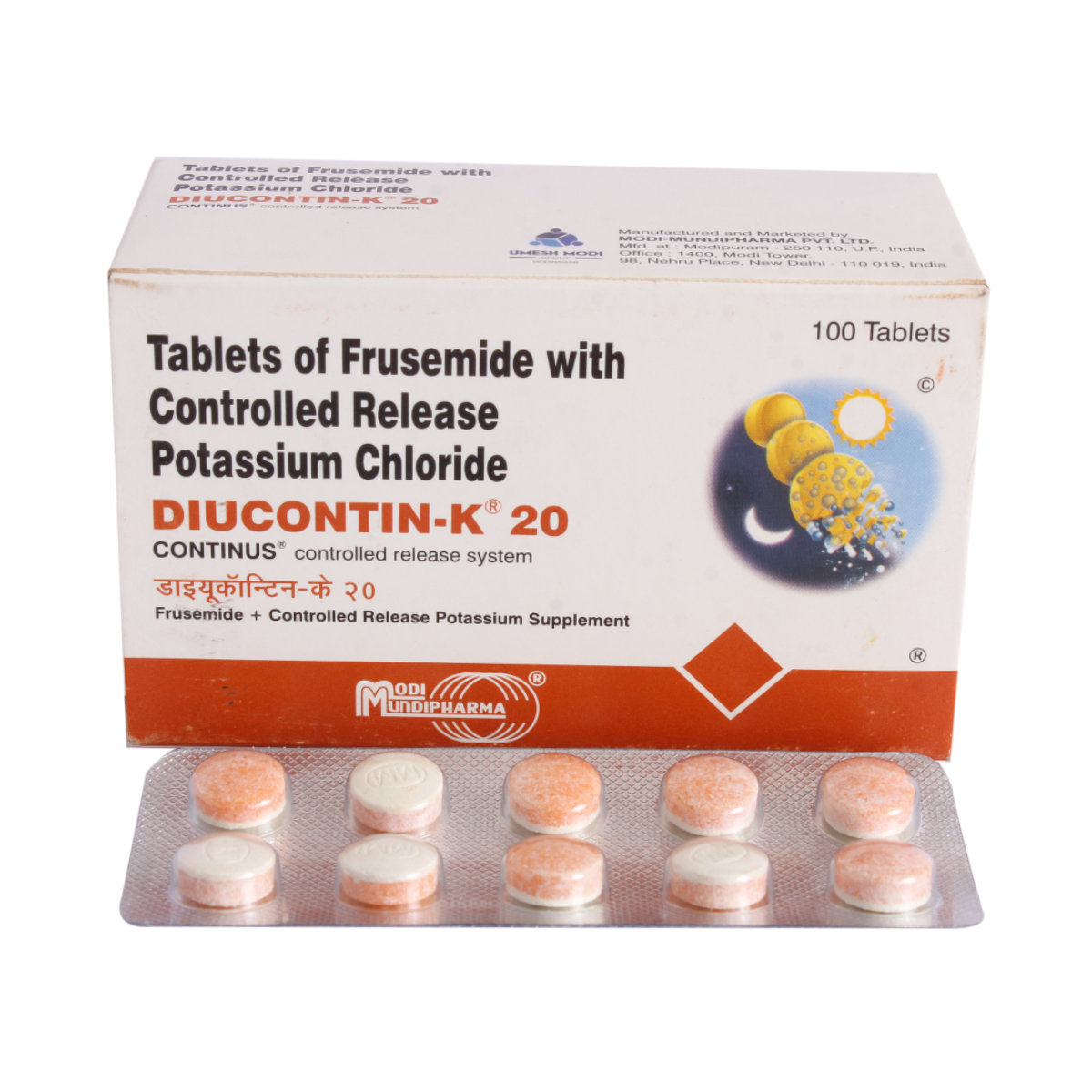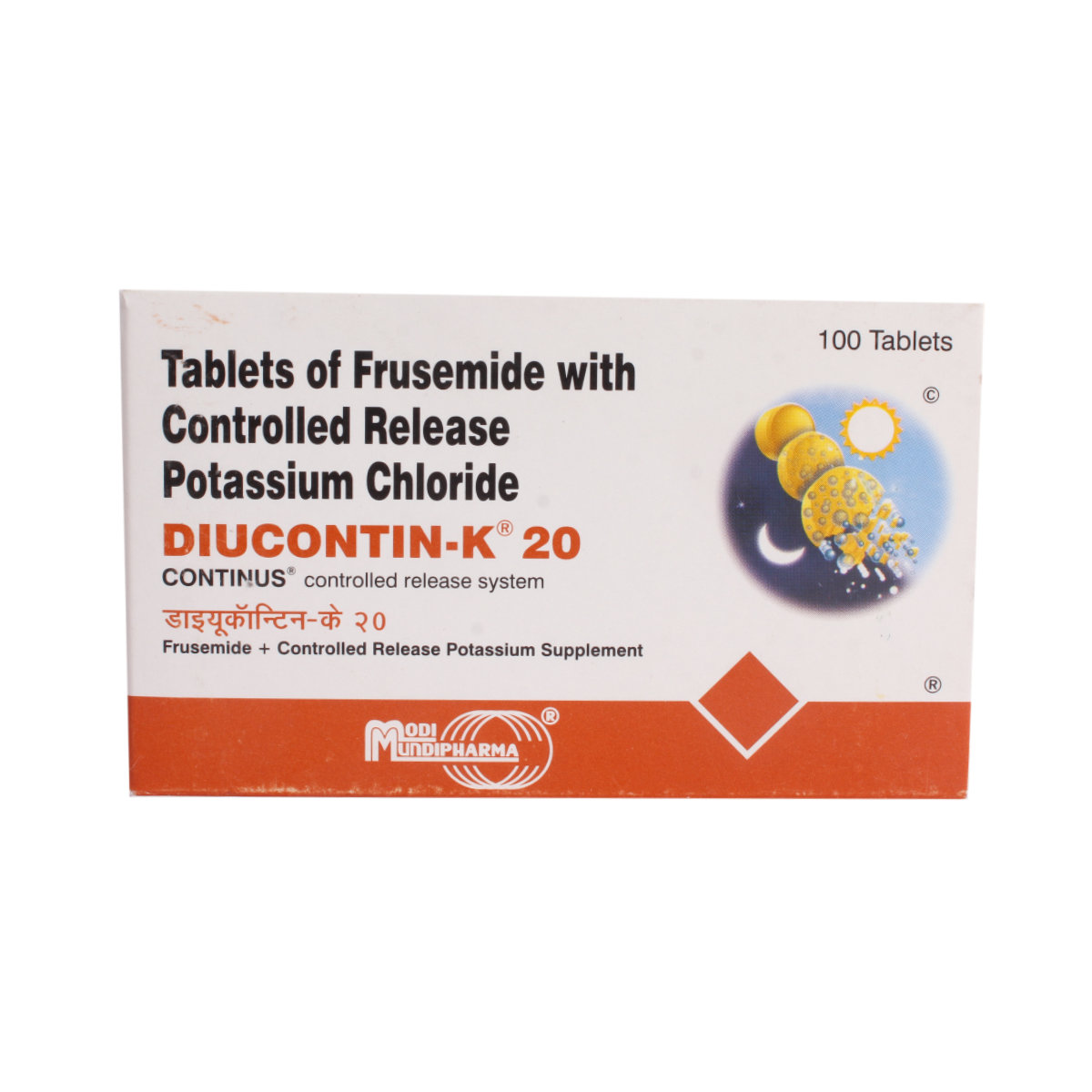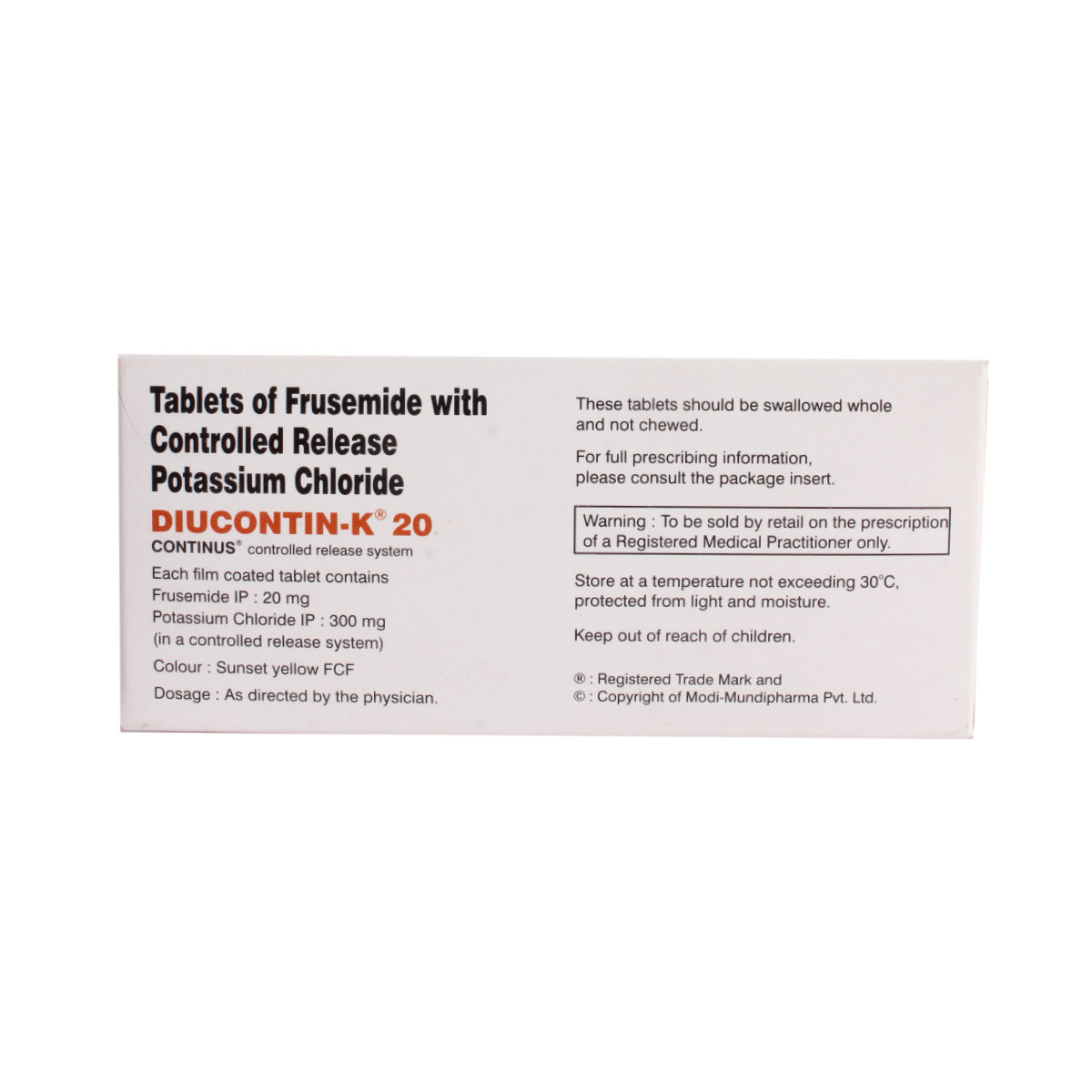Diucontin K 20 mg Tablet 10's
MRP ₹64
(Inclusive of all Taxes)
₹9.6 Cashback (15%)
Provide Delivery Location

secured payment

india's most trusted pharmacy

genuine products
Composition :
Manufacturer/Marketer :
Consume Type :
Expires on or after :
Return Policy :
About Diucontin K 20 mg Tablet
Diucontin K 20 mg Tablet belongs to a group of medicines called diuretics (which increase the production of urine) and is primarily used to treat edema. A condition in which the swelling occurs when too much fluid becomes trapped in the tissues of the body, particularly the skin. Many possible causes of edema include heart failure, kidney failure, liver diseases and also by certain medications.
Diucontin K 20 mg Tablet contains furosemide and potassium chloride. Furosemide is a diuretic that removes extra water and certain electrolytes from the body by increasing the amount of urine produced. In doing so, it causes potassium loss. Potassium chloride is a mineral supplement added to prevent low levels of potassium in the blood. Thus Diucontin K 20 mg Tablet improves the fluid overload associated with kidney, liver, heart diseases and also prevents the loss of potassium.
You can take Diucontin K 20 mg Tablet with food or without food. It should be swallowed whole with a glass of water. Do not chew, bite, or break it. Your doctor will advise you on how often you take your tablets based on your medical condition. In some cases, you may experience nausea, vomiting, diarrhoea, flatulence, stomach pain, and dehydration. Most of these side effects of Diucontin K 20 mg Tablet do not require medical attention and gradually resolve over time. However, if the side effects are persistent, reach out to your doctor.
Inform your doctor before stopping the Diucontin K 20 mg Tablet . Inform your doctor if you are suffering from any kidney or liver or heart disease. If you are pregnant or breastfeeding, please tell your doctor so that the dosage of Diucontin K 20 mg Tablet can be prescribed accordingly. Please tell your doctor if you had an allergic reaction to Diucontin K 20 mg Tablet or any other medicine in the past. Reducing the amount of table salt (sodium chloride) in your food often relieves the swelling of the body. Diucontin K 20 mg Tablet should be used with caution in anuria ( a condition in which the kidney is unable to produce urine), electrolyte imbalance, hearing problem, gastrointestinal lesions, hyperkalemia, and metabolic acidosis.
Uses of Diucontin K 20 mg Tablet

Have a query?
Directions for Use
Key Benefits
Diucontin K 20 mg Tablet contains furosemide and potassium chloride belongs to a group of medicines called diuretics (which increase the production of urine) and is primarily used to treat edema. . Furosemide is a diuretic that removes extra water and certain electrolytes from the body by increasing the amount of urine produced. In doing so, it causes potassium loss. Potassium chloride is a mineral supplement added to prevent low levels of potassium in the blood. Thus Diucontin K 20 mg Tablet improves the fluid overload associated with kidney, liver, heart diseases and also prevents the loss of potassium. Diucontin K 20 mg Tablet is used in the treatment of cardiac edema, pulmonary edema, hepatic edema, renal edema, and peripheral edema of various etiologies.
Storage
- Do not stand up suddenly. Lie down and get up slowly only when you feel better.
- Avoid alcohol and large meals.
- Drink enough water before standing for long periods.
- Exercise regularly; however, avoid exercising in extreme heat.
- Eat small, low-carb meals.
- Wear compression stockings.
- Inform your doctor about dizziness symptoms. They may adjust your medication regimen or prescribe additional medications to manage symptoms.
- Follow your doctor's instructions for taking medication, and take it at the same time every day to minimize dizziness.
- When standing up, do so slowly and carefully to avoid sudden dizziness.
- Avoid making sudden movements, such as turning or bending quickly, which can exacerbate dizziness.
- Drink plenty of water throughout the day to stay hydrated and help alleviate dizziness symptoms.
- If you're feeling dizzy, sit or lie down and rest until the dizziness passes.
- Track when dizziness occurs and any factors that may trigger it, and share this information with your doctor to help manage symptoms.
- Hydrate your body: Drink enough water to prevent dehydration and headaches.
- Calm Your Mind: Deep breathing and meditation can help you relax and relieve stress.
- Rest and Recharge: Sleep for 7-8 hours to reduce headache triggers.
- Take rest: lie down in a quiet, dark environment.
- Cold or warm compresses can help reduce tension.
- Stay Upright: Maintain good posture to keep symptoms from getting worse.
- To treat headaches naturally, try acupuncture or massage therapy.
- Over-the-counter pain relievers include acetaminophen and ibuprofen.
- Prescription Assistance: Speak with your doctor about more substantial drug alternatives.
- Severe Headaches: Seek emergency medical assistance for sudden, severe headaches.
- Frequent Headaches: If you get reoccurring headaches, consult your doctor.
- Headaches with Symptoms: Seek medical attention if your headaches include fever, disorientation, or weakness.
- Skin rash caused by allergies is due to irritants or allergens. Therefore, avoid contact with such irritants.
- Consult your doctor for proper medication and apply an anti-itch medication. Follow the schedule and use the medication whenever needed.
- Protect your skin from extreme heat and try to apply wet compresses.
- Soak in the cool bath, which gives a soothing impact to the affected area.
- Gently massage the affected area using your hands or a massager.
- Light exercises such as walking or climbing stairs may help the muscles return to normal.
- Apply heat/ice to the affected area.
- Drink electrolyte-rich fluids.
- Inform your doctor immediately if you experience ringing, buzzing, or other unusual sounds in your ears after taking medication.
- Schedule an appointment to discuss symptoms and determine if the medication is the cause.
- Your doctor may adjust your treatment plan by changing dosage, switching to a different medication, or stopping the medication.
- Your doctor may recommend sound therapy or relaxation techniques to manage tinnitus symptoms.
- Regularly track symptoms and report changes to your healthcare provider to ensure effective management.
Drug Warnings
Inform your doctor before stopping the Diucontin K 20 mg Tablet . Inform your doctor if you are suffering from any kidney or liver or heart disease. If you are pregnant or breastfeeding, please tell your doctor so that the dosage of Diucontin K 20 mg Tablet can be prescribed accordingly. Please tell your doctor if you had an allergic reaction to Diucontin K 20 mg Tablet or any other medicine in the past. Reducing the amount of table salt (sodium chloride) in your food often relieves the swelling of the body. Diucontin K 20 mg Tablet should be used with caution in anuria ( a condition in which the kidney unable to produce urine), hearing problems, electrolyte imbalance, diabetes, gastrointestinal lesions, hyperkalemia, and metabolic acidosis (electrolyte disorder characterized by an imbalance in the body's acid-base balance).
Drug-Drug Interactions
Drug-Drug Interactions
Login/Sign Up
Taking Ziprasidone with Diucontin K 20 mg Tablet can increase the risk of abnormal heart rhythm.
How to manage the interaction:
Taking Ziprasidone with Diucontin K 20 mg Tablet is not recommended, but it can be taken together if prescribed by a doctor. However, consult your doctor if you experience sudden dizziness, lightheadedness, fainting, shortness of breath, weakness, tiredness, drowsiness, confusion, muscle pain, cramps, dizziness, nausea, or vomiting. Do not discontinue any medications without consulting a doctor.
Taking Olanzapine with Diucontin K 20 mg Tablet can increase the risk of stomach ulcers, bleeding, and gastrointestinal injury.
How to manage the interaction:
Co-administration of Olanzapine and Diucontin K 20 mg Tablet is not recommended as it leads to an interaction, it can be taken if advised by a doctor. However, if you experience any symptoms like severe abdominal pain, bloating, sudden dizziness or lightheadedness, nausea, vomiting (especially with blood), loss of appetite, and/or black, tarry stools, contact a doctor immediately. Do not discontinue any medications without consulting a doctor.
Taking Biperiden with Diucontin K 20 mg Tablet can increase the risk of stomach ulcers.
How to manage the interaction:
Taking Biperiden with Diucontin K 20 mg Tablet is not recommended as it can lead to an interaction, but can be taken if prescribed by the doctor. However, if you experience severe stomach pain, bloating, sudden lightheadedness or dizziness, nausea, vomiting (especially with blood), decreased hunger, or dark, tarry stools, consult the doctor immediately. Do not discontinue any medications without a doctor's advice.
The combination of Amitriptyline and Diucontin K 20 mg Tablet may cause stomach and upper intestinal discomfort. (Only applicable to an oral preparation)
How to manage the interaction:
Although co-administration of Amitriptyline and Diucontin K 20 mg Tablet is not recommended as it can possibly lead to an interaction, they can be taken if prescribed by a doctor. If you experience severe stomach pain, bloating, sudden dizziness or lightheadedness, nausea, vomiting (in particular with blood), decreased hunger, and black stools while taking these medications, consult a doctor immediately. Do not discontinue any medications without talking to a doctor.
Taking Mepenzolate and Diucontin K 20 mg Tablet(in tablet or capsule form) together can increase the risk of stomach ulcers, bleeding, and other gastrointestinal injury.
How to manage the interaction:
Taking Mepenzolate with Diucontin K 20 mg Tablet is not recommended, as it can lead to an interaction, it can be taken if a doctor has prescribed it. However, if you experience severe stomach pain, bloating, sudden lightheadedness or dizziness, nausea, vomiting (especially with blood), decreased hunger, dark, tarry stools, consult the doctor immediately.
Using Eplerenone together with Diucontin K 20 mg Tablet may significantly increase potassium levels in the blood.
How to manage the interaction:
Taking Diucontin K 20 mg Tablet with eplerenone is not recommended. You can take these medicines if prescribed by a doctor. Consult a doctor if you experience nausea, vomiting, weakness, disorientation, tingling in your hands and feet, feelings of heaviness in your legs, a weak pulse, or an irregular heartbeat, consult the doctor immediately. It is essential to maintain proper fluid intake while taking these medications. Do not discontinue any medications without a doctor's advice.
Taking Doxepin with Diucontin K 20 mg Tablet can increase the risk of stomach ulcers.
How to manage the interaction:
Taking Doxepin with Diucontin K 20 mg Tablet is not recommended, as it can lead to an interaction, but it can be taken if a doctor has prescribed it. However, if you experience severe stomach pain, bloating, sudden lightheadedness or dizziness, nausea, vomiting (especially with blood), loss of appetite, or dark, tarry stools, consult the doctor immediately. Do not discontinue any medications without a doctor's advice.
Taking Phenindamine and Diucontin K 20 mg Tablet (in tablet or capsule form) together can increase the risk of stomach ulcers, bleeding, and other gastrointestinal injury.
How to manage the interaction:
Taking Phenindamine with Diucontin K 20 mg Tablet is not recommended, as it can lead to an interaction, it can be taken if a doctor has prescribed it. However, if you experience severe stomach pain, bloating, sudden lightheadedness or dizziness, nausea, vomiting (especially with blood), decreased hunger, dark, tarry stools, consult the doctor immediately.
Taking Dexchlorpheniramine and Diucontin K 20 mg Tablet can increase the risk of stomach inflammation.
How to manage the interaction:
Taking Dexchlorpheniramine with Diucontin K 20 mg Tablet (in tablet or capsule form) is avoided as it can lead to an interaction, it can be taken if a doctor has prescribed it. However, if you experience severe stomach pain, bloating, lightheadedness, vomiting, or dark stools, consult the doctor immediately. Do not stop using any medications without talking to a doctor.
Combining Orphenadrine with Diucontin K 20 mg Tablet can increase the risk of stomach ulcers.
How to manage the interaction:
Taking Orphenadrine (citrate) with Diucontin K 20 mg Tablet is not recommended, as it can lead to an interaction, can be taken if your doctor has prescribed it. However, if you experience severe stomach pain, bloating, sudden lightheadedness or dizziness, nausea, vomiting (especially with blood), decreased hunger, dark, tarry stools, consult the doctor immediately.
Drug-Food Interactions
Drug-Food Interactions
Login/Sign Up
Diet & Lifestyle Advise
- Keep your weight under control with a BMI of 19.5-24.9.
- Do regular physical activity or exercise for at least 150 minutes per week, or about 30 minutes most days of the week. Doing this can help you to lower your raised blood pressure by about 5 mm of Hg.
- Opt for a diet rich in whole grains, fruits, veggies, and low-fat dairy products.
- Limit intake of sodium chloride (table salt) in your daily diet to 2300 mg per day or less than 1500 mg is ideal for most adults.
- If you are taking alcohol then only one serving for women and two servings for men is advisable.
- Quitting smoking is the best strategy to lower the risk of heart disease.
- Try to include heart-healthy omega 3 fatty acids containing food drinks in your daily diet. You can also use low-fat cooking oil like olive oil, soybean oil, canola oil, and coconut oil can help in lowering your elevated blood pressure.
Habit Forming
Therapeutic Class
Alcohol
Safe if prescribed
You are not recommended to consume alcohol along with Diucontin K 20 mg Tablet to avoid unpleasant side-effects.
Pregnancy
Consult your doctor
Diucontin K 20 mg Tablet should not be used during pregnancy unless clearly necessary. Your doctor will weigh the benefits and any potential risks before prescribing it to you. Please consult your doctor.
Breast Feeding
Consult your doctor
Diucontin K 20 mg Tablet should not be used when breastfeeding unless clearly necessary. Your doctor will weigh the benefits and any potential risks before prescribing it to you. Please consult your doctor.
Driving
Safe if prescribed
It is not recommended to drive after taking Diucontin K 20 mg Tablet as it may occasionally cause drowsiness.
Liver
Consult your doctor
Diucontin K 20 mg Tablet to be taken with caution, especially if you have a history of liver diseases/conditions. Your doctor may adjust your dose depending upon your current liver conditions.
Kidney
Consult your doctor
Diucontin K 20 mg Tablet to be taken with caution, especially if you have a history of Kidney diseases/conditions. Your doctor may adjust your dose depending upon your current kidney conditions.
Children
Safe if prescribed
Diucontin K 20 mg Tablet to be taken with caution, especially if you are children below the age of 12. Your doctor may adjust your dose depending upon your age.
FAQs
Diucontin K 20 mg Tablet contains furosemide and potassium chloride. Furosemide is a diuretic that removes extra water and certain electrolytes from the body by increasing the amount of urine produced. In doing so, it causes potassium loss. Potassium chloride is a mineral supplement added to prevent low levels of potassium in the blood. Thus Diucontin K 20 mg Tablet improves the fluid overload associated with kidney, liver, heart diseases and also prevents the loss of potassium.
Diucontin K 20 mg Tablet cause common side effects like nausea, vomiting, diarrhoea, flatulence, stomach pain, dehydration, decreased sodium level in the blood, decreased magnesium level in the blood, decreased calcium level in the blood, increased uric acid level in blood. Most of these side effects of Diucontin K 20 mg Tablet do not require medical attention and gradually resolve over time. However, if the side effects are persistent, reach out to your doctor.
Yes, Diucontin K 20 mg Tablet is contraindicated in people with known allergy to any of the components of Diucontin K 20 mg Tablet . It should be avoided in people with severe kidney or liver impairment and in people with anuria (reduction or absence of urine), and hyperkalemia.
There's no evidence that Diucontin K 20 mg Tablet reduces fertility in men or women. However, if you're a woman and you're trying to get pregnant, talk to your doctor first.
Country of origin
Manufacturer/Marketer address









